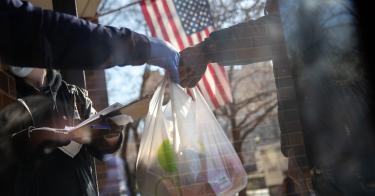As you hunker down to face the COVID-19 emergency, are you doing so as an American—or as a member of one of the demographic subgroups the hucksters of identity politics have peddled over the past 40 years?
Chances are that for the vast majority the answer will be the former. That would offer glimpses of how identity politics can end.
After we get through this together (and we will) we will remember that we did this as members of a local community, a state and, ultimately, a nation. We will not have seen our way out as “Hispanics,” “Asians,” “LGBTQIAs,” etc.
That is because a crisis provides clarity as to what is real. The community that matters right now is a geographic, real place. It’s made up of neighbors getting groceries for each other and watching your kids while schools are closed.
That state will have a governor, who has the power to close schools, declare a state of emergency or call the National Guard. The nation comes with the resources of the federal government, but there’s more to it than that.
There’s a reason everyone is invoking a primordial understanding that great peoples can summon the collective will required for “shared sacrifice.”
“Through a very collective action and shared sacrifice and national determination, we will overcome the threat of the virus.” That’s how President Trump put it at his March 13 Rose Garden news conference.
In other words, the identities that matter are real, organic and contain emotional attachments that can be beckoned in times of crisis. Men landed on the beach at Normandy in 1944, died at Gettysburg in 1863 and Lexington in 1775 because of this sense of shared mission, and shared sacrifice. Americans defeated Communism, segregation, Nazism and Japanese nationalism by banding together in a common cause.
Identity politics seeks to separate rather than unite, accentuate differences rather than common cause. It delocalizes people, ignoring geographic communities to produce constituencies untethered to time and place.
When a woke hipster asks what “members of your community” think, he isn’t asking about the sentiments expressed at the “Donut Hour” after mass or the house of your kid’s friend. He means some hypothetical, deracinated group based on race, ethnicity, sex, sexual orientation.
I say hypothetical because oftentimes these categories are fictional. They were carefully forged by radical activists in the 1970s for the purpose of transforming America into something very different from its ideals, with a degree of central planning the Founders never intended.
As I explain in my forthcoming book, “The Plot to Change America,” these activists intimidated federal bureaucrats already shaken by the riots of mid-century into officializing these identities by including them in the Census and other national surveys.
They then created a skein of racial-preference benefits meant to convince originally leery rank-and-file Americans to embrace the categories.
The central idea is that America is divided into two groups, oppressors and the marginalized, and all of life is a constant power play. The marginalized can be liberated only if they drive out the “hegemonic narrative” of the oppressors and replace it with their own.
In his superb new book, “A Time to Build,” social scientist Yuval Levin notes that modern universities expose students, “often for the first time, to the argument that there exists a pervasive structure of social oppression in our society.” Students then “carry those expectations with them” when they enter the work force.
But all of this is the very antithesis of the unity we need to confront coronavirus. We will defeat coronavirus not because we are at each other’s throat, but because we are putting shoulder to shoulder, irrespective of whatever “identity” was concocted for us. If we remember that lesson when this is over, we may begin to build real communities again.
This piece originally appeared in the New York Post




